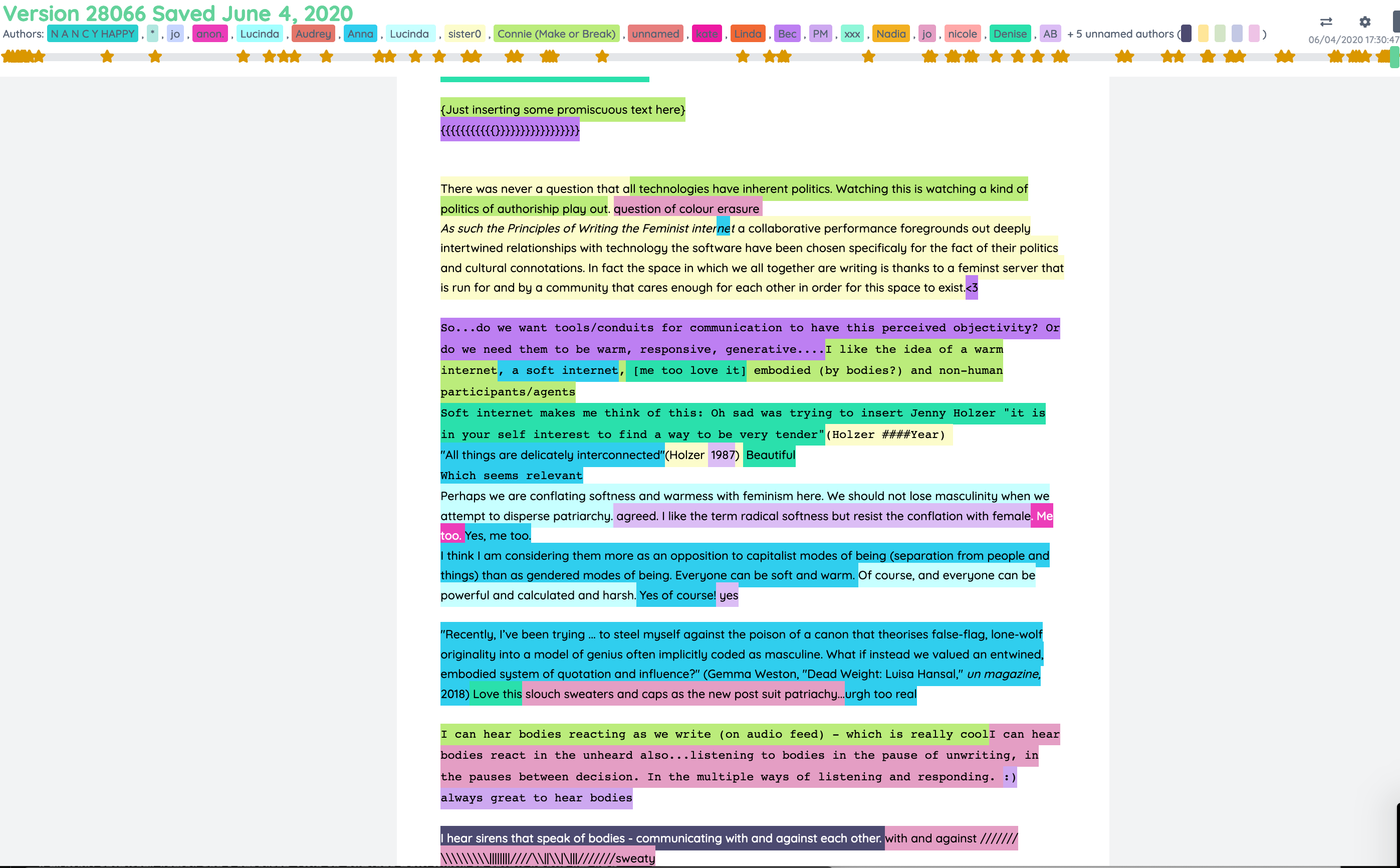Writing the Feminist Internet
| Writing the Feminist Internet | |
|---|---|
| Name | Writing the Feminist Internet |
| Location | Internet |
| Date | 2020/07/25 |
| Time | 10:00-12:00 |
| PeopleOrganisations | Despoinas Media Coven |
| Type | HDSA2020 |
| Web | Yes |
| No | |
This is a 2-hour collaborative writing session, morphing, exploring, expanding upon collaborative series of working points, principles and lores together we will overwrite, edit, correct, challenge, echo, duplicate, expand, solidify, summarise, nuance, incant... a working definition of a *feminist internet in the context of the writing session folds in all the waves *waves* \0\ \0/ /0/ We will perform our politics live, for each other, carving out online space away from systems of imperial fixity, and towards skill sharing, fluidity and multiplicity. Participants are enabled to embrace literary freedom: riffing off, reimagining, rejecting or rephrasing the original text with the results being merged at the end of the session and synthesised in the form of active poetry. We are working from the position of an *open feminism that embraces multiplicity, diversity, queerness, unfixed-ness, becoming, transforming, shifting, making space for underrepresented voices, and not privileging our voices in relation to others – nor doom scrolling but instead affirmative feeling through sentences, and dancing words and with other people. We will be in a multiple-author writing pad, Etherpad - a tool for public collaboration, what we are doing today in the most basic sense, is working in a document together. We want you to help us deconstruct, or build upon, or challenge, or add to a working document. The text we are working with contains 10 working points that are propositions to seed the grounds for performative explorations into diverse feminist traditions of knowledge production. These working points have been drafted with feedback from many collaborators along the way, and we are expanding in each iteration, further today, with local and remote presences. Why? Carving out online space that is fluid and wayward, experientially learn together through deciphering, interpreting, trying, failing, and blossoming. Indeterminate writing is an act of care, mediation and healing, by deploying networked tools away from tactics of control, other kinds of knowledge exchange and voices to arise and intermingle in this space of possibility.
Your hosts in this collaborative space are Despoinas Media Coven, Hackers & Designers Summer Academy (HDSA2020) and all of you.
🐚 Steps to prepare 🐚
- No technical experience necessary;
- You'll need an internet-connected computer device, with a monitor and keyboard, installed with Firefox or Chrome Browser -otherwise some features of this platform won't work for you.
Requirements:
- willingness to learn
- work collectively
- a tolerance for ambiguity
- a respect for our 🐚 CODE OF CONDUCT 🐚 [or you’ll be kicked off the platform and/or asked to leave the event].
Despoinas Media Coven (DMC) homebrewed since 2008, began as a garage hackspace to remove the strict barriers between software users and developers to enable the ‘uninitiated’ into using free software. An transdisciplinary collective and an autonomous feminist web server to host creative arts projects, based in Hobart, Tasmania, the collective is connected through satellite agents: artists, programmers, critical engineers, writers, designers, dancers, comrades, curators and thinkers from around the planetary archipelago for to make, to exchange, diversify narratives, strategise and constructively critique - to keep moving with the manifold of time. Despoinas Media Coven was described as a 'technological coven disguised as an art project’ (WARP Magazine 2013) and continues to host digital literacy sewing circles, stretching networks through museums, galleries, stages, through radiowaves and under waterfalls. Projects events and discussions range from the political implications of critical making to feminist reflections on the place of technology in culture and society. DMC taps into the principle of ‘knowledge sharing’ passionately emphasised by the Free Software Foundation. The Free Software Foundation campaigns for computer users’ freedom to cooperate and control their own computing conduct. The dilemma is not that it is proprietary software (closed to the source) being used to program the computer (some proprietary applications are open source and cost money) it is rather an ethical issue. When the source code is both copyrighted and closed a problematic situation arises; the user may be unable to modify the software to his or her idiosyncratic needs or acknowledge the source. So when an artist works with software their creativity is *limited - stunted - paralysed* if they are unable to extend the medium beyond a particular limit.
